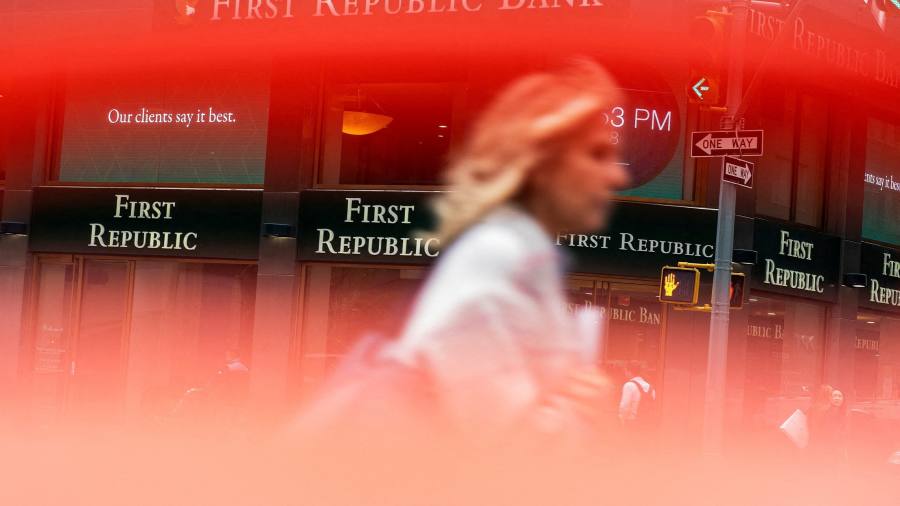The US government has asked JPMorgan, PNC and several other financial groups, including a few non-bank investment firms, to bid for all or part of First Republic, as US regulators try to determine the cost of taking over the embattled area. California lender.
Four people briefed on the situation said it became clear this weekend to both First Republic and the government that stabilizing the bank would almost certainly require the FDIC to take over.
First Republic shares have lost more than 97 percent of their value this year, spurred by concerns about paper losses on mortgage book and other assets and massive deposit outflows after the March 10 collapse of the Silicon Valley bank.
On Wednesday, the FDIC asked about a dozen banks to tell them what they would be willing to pay for First Republic deposits and assets, and what level of losses the FDIC would have to absorb to get the deal through, according to people familiar with the discussions.
On Friday, the regulator went back to JPMorgan, PNC and several other lenders and offered to give them access to more detailed information about First Republic. Potential bidders have been given digital access to a data room containing comprehensive information on First Republic loans and other assets, according to two sources familiar with the process. A number of investment firms have also been given access to the data and encouraged to bid.
Banks and others have been told bids are welcome which will include First Republic being taken into receivership, and the winning bid will likely include some help from the FDIC insurance fund. Bidders have been given until Sunday to submit binding bids.
Guggenheim is advising the FDIC on the process, according to people familiar with the matter.
JPMorgan, which led a previous effort to stabilize the First Republic by convening a group of 11 banks to place $30 billion in deposits at the lender, is now preparing to offer a post-settlement deal, three people familiar with the situation said. JPMorgan and BNC declined to comment.
It’s not clear how many other banks will be bidding, or if the FDIC will find any of the bids acceptable. When SVB failed, other lenders initially refused to bid, and the FDIC set up a bridge bank to give its clients access to their money.
“We cannot comment on or confirm reports that we are bidding for an open and running bank,” the FDIC said.
If San Francisco-based First Republic were taken over by the FDIC, it would be among the biggest bank failures in US history, along with Washington Mutual in 2008 and SVB.
The First Republic’s business model of using low-cost deposits to fund cheap mortgages has shrunk due to rising interest rates. On Monday, it revealed that customers had withdrawn more than $100 billion in deposits as concerns grew about regional banks in the wake of SVB’s collapse.
When a US bank fails, the FDIC solicits bids from other lenders of its deposits and assets to determine the best protection for customers and reduce the cost of the government’s deposit insurance fund. The FDIC is funded by a tax on banks.
The goal is to find a buyer before the FDIC actually takes over. But this does not always happen. In the case of SVB, the FDIC used a so-called “systemic risk exemption” to insure all deposits, including deposits too large to be covered by deposit insurance. It’s not clear if it will do the same for First Republic’s large depositors.
Speaking Sunday to CBS News, Ro Khanna, the Democratic representative from California, said the FDIC’s mandate is to look for the least expensive option, even if it means First Republic falling into the hands of one of the largest banks in the country.
He also renewed calls for the government to guarantee all bank deposits or risk further flight from regional banks to major lenders.
The Wall Street Journal first reported that JPM and PNC had been asked to submit bids.

“Typical beer advocate. Future teen idol. Unapologetic tv practitioner. Music trailblazer.”







More Stories
JPMorgan expects the Fed to cut its benchmark interest rate by 100 basis points this year
NVDA Shares Drop After Earnings Beat Estimates
Shares of AI chip giant Nvidia fall despite record $30 billion in sales